Moving to a new area is like picking the right spot for your life story. Start by thinking about what makes you happy each day. How far is work? Where will you buy food? Can you afford to live there?
Look at the schools if you have kids. Check if the streets are safe. See what new things they plan to build nearby.
Walk around the streets. Talk to people who live there. Visit the parks. Stop by in the morning and at night to see how things feel at all hours.
When you take time to look at all these things, you can find a place that feels just right for you and your family.
Ready to start building equity in your own Michigan home? Get your personalized home loan quote today.
Define Your Must-Have Features

Finding the right place to live starts with knowing what you really need. Think about what matters in your daily life. How far will you drive to work? Do you want to be close to good schools? Can you walk to the bus or train? You need to reach stores and doctors easily too.
Look at what's around you. Maybe you love to walk in parks or want quiet streets. Some people like busy areas with lots of shops. Others want calm spots with big yards.
Think about your neighbors. Do you want to live near families with kids? Do you care about block parties or fun things to do? How much noise can you handle? Do you mind living close to others?
Write down all these things you must have. Use this list to help pick the best spot for you.
Michigan residents, unlock the door to your new home. Request your home loan quote from Treeside Financial today.
Calculate Your Real Budget
Let's talk about your real home costs.
First, look at what you can spend each month. Your home will cost more than just the house payment. You need to add up:
- House payment
- Property tax
- Home insurance
- Power and water bills
- HOA fees (if you have them)
Here's what you might pay each month and year:
| Expense Type | Monthly Cost | Annual Impact |
|---|---|---|
| Mortgage | $1,800 | $21,600 |
| Property Tax | $400 | $4,800 |
| Insurance | $150 | $1,800 |
Think about how you get to work too. Count the money you spend on:
- Gas
- Parking
- Bus or train fares
A home that costs less might not save you money if you spend more to get to work. For example, saving $200 on a house payment is not good if you spend $300 more on gas.
Write down all these costs. Add them up. This shows you what you'll really spend each month.
Research the Local Job Market

Think about where you want to work before picking your new home.
Look at what jobs are growing in the area. Find out which big companies are there and if they're hiring more people.
Check how much money you could make in your type of work. Look at pay in each area you like.
This will help you know if you can live well and find good work there.
Employment Growth and Trends
Jobs Make Good Homes Better
When you want to move, look at how many jobs are in the area. Good jobs help you earn money to live well. Pick a place where lots of people can find work. Look for areas that have many types of jobs, not just one kind.
You want to see:
- New tech companies moving in
- New buildings going up
- Big, famous companies nearby
- Schools and learning places that hire people
Look at how jobs grow over time. Find out if more jobs will come in the next five years. A place with many jobs now and more coming later is best for you and your family.
Look for areas where people work in many different jobs. This means if one type of work slows down, other jobs can keep the area strong.
When you pick a place with lots of jobs, you can build a good life there.
Major Local Industries
When you look at jobs in a new area, you need to know what kinds of work people do there. Think about who gives the most jobs to people. Some places have lots of doctors and nurses. Others have many tech workers or factory jobs.
Good places to live have many different types of jobs. This helps keep the area strong when times get tough. You don't want to move somewhere that only has one kind of work.
Look for places that are growing new jobs. Stay away from areas where jobs are going away. Pick a place where you can find work you like to do.
You can learn more about jobs in any area by talking to the local business groups or looking at their websites.
Average Salary by Area
Money you can make changes a lot based on where you live. Look up what jobs pay in areas you want to move to. This helps you know if you can live the way you want and save money too. Look at job websites, talk to people who work there, and check job data.
You might make twice as much money if you live near where big companies work. When you live in places that pay more, you meet more people who can help your job grow. These areas also give you better chances to move up at work.
You'll work with people who want the same things as you when it comes to jobs and pay.
Look at how much jobs pay now and might pay later. When an area is growing, people often make more money and life gets better there too.
Map Your Daily Commute
Getting to work can be hard. Try different ways to get there during busy times. This helps you pick the best way before you move to a new area.
Think about traffic in the morning and at night. A long drive can steal time from your family and fun.
Look at buses and trains too. You can also ride a bike. These other ways might save you money and be less stressful.
Test Multiple Routes First
Choose Your Best Way to Work
Try different ways to get to work before picking your new home. Get in your car, hop on your bike, or take the bus during rush hour to see how long it takes. Don't just trust what your phone map tells you.
When you test new routes, you can:
- Find a nice way that saves you time
- Know other ways to go if traffic is bad
- Feel good about your daily trip
- Spend more time at home with your family
Go on each route a few times. Write down how long it takes and how it makes you feel.
A great house won't feel so great if you hate the trip to work every day.
Calculate Rush Hour Impact
Traffic can make your daily drive much longer than you think. Let's see how long it takes to get where you need to go at different times.
Try your drive at these times:
- Early morning (7-9am)
- After work (4-6pm)
- During quiet times
| When to Drive | What to Look For |
|---|---|
| Morning | School zones |
| Evening | Other ways to go |
| Weekend | Big events |
| Quiet Times | Normal traffic |
| Weather | Rain or snow |
Don't just trust what your phone tells you. Write down how long each drive takes for a week. Look for spots where traffic gets bad. A nice house won't feel so nice if you spend too much time in traffic. Think about if you can work at times when roads are less busy.
Consider Alternative Transportation Options
Getting around doesn't mean you must drive a car. When you pick a new home, look at all the ways you can move from place to place. Many great places let you get to work, stores, and friends in different ways.
You can:
- Walk or ride a bike on safe paths and say hi to your neighbors
- Take a bus or train and skip the stress of finding parking
- Share rides with others to save money and make new friends
- Rent a bike from stands near you for quick trips
Before you pick where to live, check how easy it's to move around.
Places with lots of ways to get around help people connect better. They also let you choose the best way to travel each day.
Evaluate School District Performance
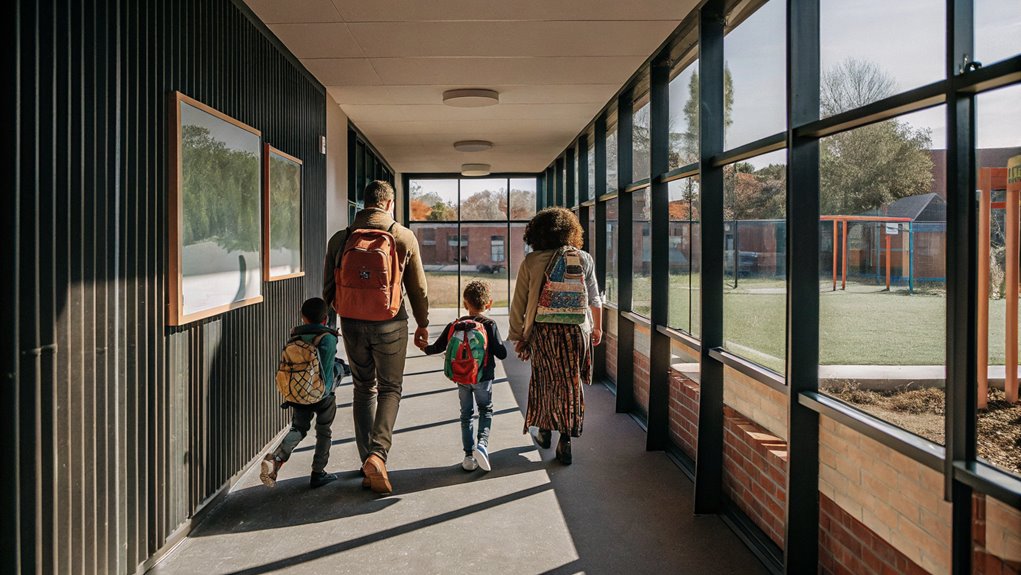
Schools help make a neighborhood great. Good schools mean your home will keep its value and your area will stay nice. You can look up how well kids do on tests and how many finish high school. You can also see how many teachers there are for each student.
Take time to look at what kids can learn. Some schools have special classes for smart kids. Others focus on science or art. You can read what parents say about the schools online.
Go see the schools yourself when parents drop off or pick up their kids. Talk to parents who live there. You can also go to school meetings to learn what matters to them and what problems they face.
Explore Community Culture
Want to know what life is like in your new area? Go to fun events where people meet.
Visit street fairs, farmers' markets, and block parties. See how people share food, art, and music.
Watch how they've fun together. This helps you learn if you'll feel at home there.
You can join in and meet your future neighbors. See if they do things you like to do too.
Local Events and Activities
Going to local events helps you see what your neighborhood is really like. You can watch how people talk to each other and what they like to do. This helps you know if you'll fit in before you move there.
You can:
- Go to fun festivals where you can make new friends
- Visit markets where farmers sell fresh food and know you by name
- Play sports with others in your area
- Meet people at the library, see art, and join in fun celebrations
Look at message boards and local websites to find events near you.
You'll know fast if the area has fun things you want to do and nice people you want to meet.
Cultural Diversity and Traditions
People make their neighborhoods special by sharing their different ways of life. You can see this when neighbors come together for fun festivals. You can taste it in the many kinds of food at local restaurants. You can feel it when you visit places where people share their culture with others.
Look around the streets. You might see beautiful wall paintings that tell stories. You might find shops that sell foods from around the world. You might spot churches, temples, and other places where people pray. These show that everyone is welcome here.
Think about what matters to you. Do you want to meet people who are different from you? Do you want to learn new things?
Good neighborhoods bring people together. They've food fairs where everyone shares their favorite dishes. They've fun events where neighbors become friends.
Check Crime Statistics
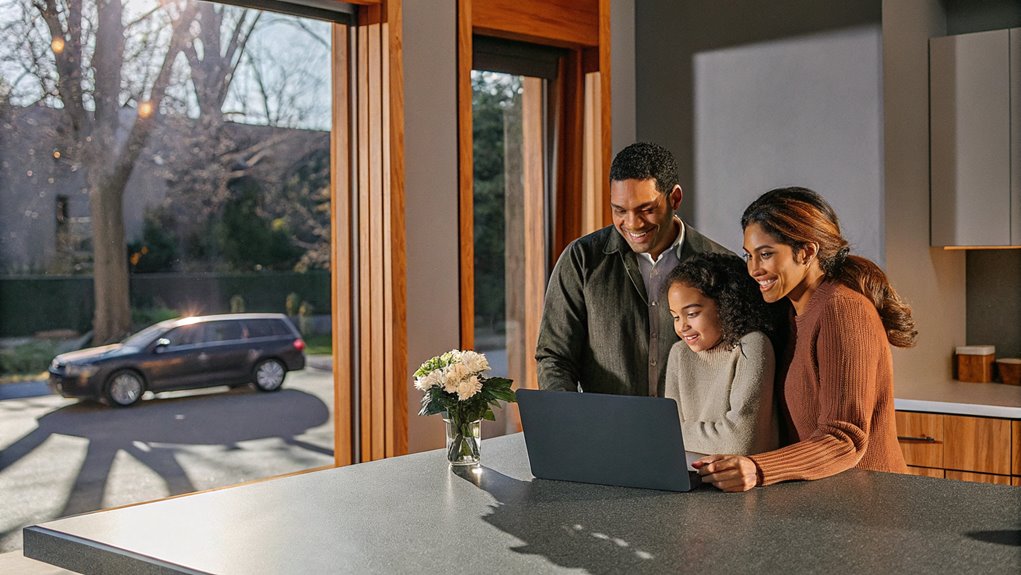
Looking at crime numbers helps you pick a safe place to live. You can find these numbers from police and neighbors who watch over the area. Many cities show their crime info online with maps.
You want a place where:
- Kids can play outside safely
- Your home and things stay safe
- Older people in the area feel safe too
- You can take walks and feel good, not scared
Look at how safe the area has been over many years. Some places get safer while others may get less safe.
Take your time to learn about different areas before you pick one.
Walk the Neighborhood
When you walk around a new neighborhood, you get to see what life is really like there. Go for walks at morning, noon, and night. Watch how many cars go by. Listen for loud noises. See what the people do.
Look at how people use their streets. You might see kids playing, dogs on walks, or folks talking to each other. Check if the streets and sidewalks are clean and if the lights work at night. Good neighborhoods often have nice yards and friendly signs.
Make sure you can walk to things you need. Look for parks where you can play. See how far you have to walk to get food or catch a bus. Being close to these places makes life easier and keeps your home worth more money.
Test Your Weekend Routine

See if your weekends will work in your new home:
Your weekends will be different in a new place. Go there on a Saturday or Sunday to see what life is like. Do the things you love to do on weekends. This will help you know if the area is right for you.
Try these fun weekend things:
- Walk to the local market to buy fresh food
- Meet people at the park near your home
- Find a good place to eat dinner
- Get to know the coffee shop workers
Do what you'd do on a normal weekend. This will show you if this place feels right. Walk around. Look at shops. See what people do for fun.
Think about your perfect weekend. Can you have it here? The only way to know is to try it out.
Remember: A good home is one where your everyday life feels just right.
Assess Future Development Plans
When you pick a new home, big changes might be coming to your area. Look for tall cranes and buildings going up nearby. These can make your street feel different over time.
Visit your city's website to see what's planned. Go to local meetings to learn more. Talk to people who live there now.
Here's what to look for:
| New Things Coming | How It Affects You |
|---|---|
| Shops and Homes | More people walking around |
| New Trains/Buses | Easier to get places |
| New Parks | Fun places to play |
| New Stores | More jobs nearby |
Look at what the city wants to build in the next 5-10 years. Some changes can make your area nicer but cost more to live in. New parks and shops often make home prices go up.
Ask about:
- What they plan to build
- When work will start
- How it might change your street
This will help you pick the right spot for your new home.
Connect With Local Residents
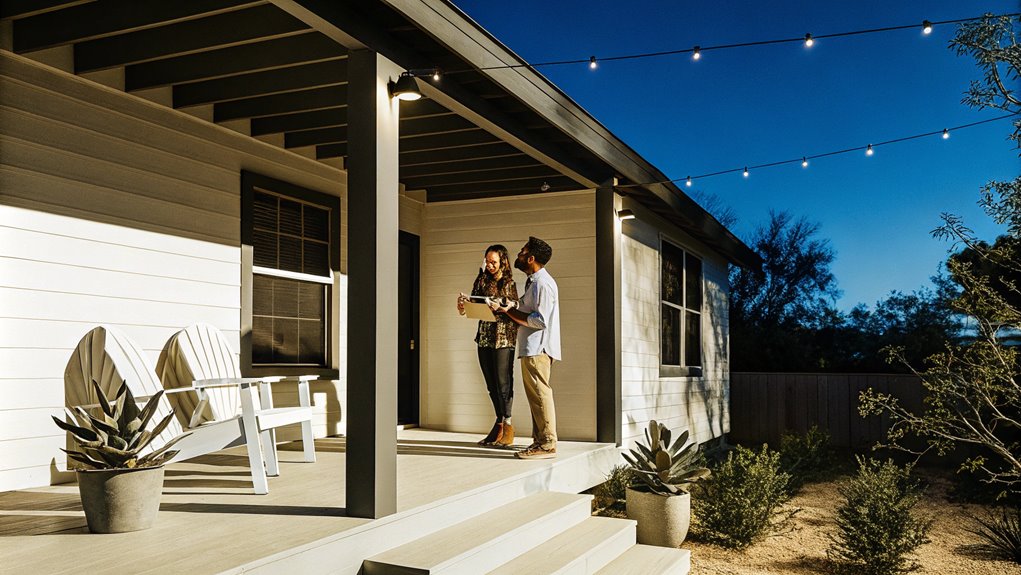
Want to know what a neighborhood is really like? Talk to the friendly people who live there!
Join local groups on Facebook and Nextdoor to see what folks chat about. Visit busy coffee shops and parks. Most people love to share stories about their area.
Ask them what they like best about living there. You can learn a lot from a short talk with someone who knows the streets, shops, and spots that make the place special.
Join Local Online Groups
When you want to learn about a new neighborhood, make friends online first! You can join local Facebook groups and talk to people who live there now. They'll tell you what life is really like.
Look for groups that match what you care about:
- Parents share tips about schools and fun places for kids
- Shop owners tell you about the best local stores
- Neighbors talk about keeping the streets safe
- People help each other and share news
You can ask questions and chat with your future neighbors. This helps you feel at home before you even move. Reading what people say will show you if the neighborhood is right for you.
Start by saying hello in these groups. The more you talk with people, the more friends you'll make. This makes moving to a new place much easier.
Strike Up Street Conversations
Talk to your future neighbors
Want to know what life is really like in a new area? Talk to the people who live there. Say hello to folks walking their dogs. Chat with people working in their yards. Stop and talk to those heading to nearby stores.
Keep your chats simple. Ask how long they've lived there. Find out where they like to eat or shop. Learn what makes them happy about living there. Also ask what bugs them about the area. This helps you see if you'd fit in.
Go out at different times to meet more people. Talk to dog walkers in the morning. Meet shoppers in the day. Chat with people taking walks at night. Each person will tell you something new about life in the area.
Visit Neighborhood Meeting Spots
People love to meet up in special places around their neighborhood. Stop by a coffee shop in the morning to see friends chat over hot drinks.
Visit the farmers market on weekends to watch neighbors buy fresh food and talk. Head to parks to see kids play while parents make new friends.
The best spots to see real neighborhood life are:
- Coffee shops where people know each other's names
- Weekend markets full of happy folks
- Parks where families have fun together
- Local food spots at dinner time
Watch how people act in these places. Look at who goes there and how they talk to each other.
This will help you know if you'll feel at home there too.
Review Zoning Laws
When you look for a new home, you need to know what you can and can't do there. Just like parks have rules about where you can play, streets have rules too. These rules are called zoning laws.
Think about what you want to do in your new home. Do you want to work from home? Build a bigger room? Let others stay at your house? Check the rules first.
Sometimes stores can open next to homes. Your quiet street might get busy if a coffee shop opens nearby.
If you join a group of homeowners, they may tell you what colors to paint your house or where to park your car.
Ask the city about new building plans. They can tell you if big changes are coming to your street. This way, you won't be surprised later.
Consider Emergency Services Access
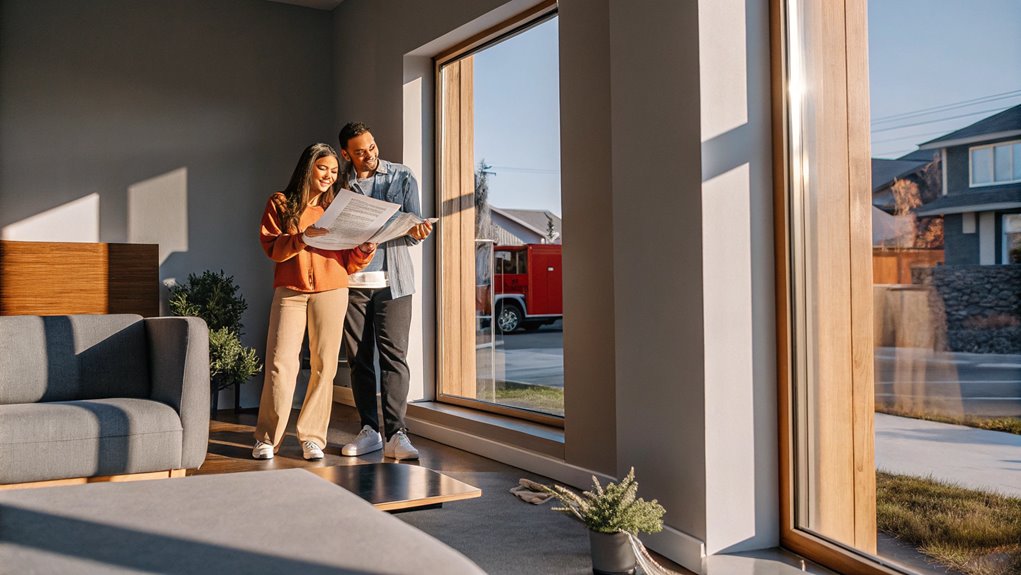
You want your family to be safe at home. When something bad happens, help needs to get there fast. Look close to fire and police stations when you pick a home. This way, helpers can get to you quickly.
Think about:
- How fast can an ambulance find your house?
- Is there a fire station nearby?
- Can big trucks get down your street?
- Will snow or rain block the road?
Talk to local fire and police teams. Ask them how long it takes to get to your area. Make sure they know how to find your house.
Pick a home where help can come fast. Your family will feel safer knowing they can get help when they need it.
Investigate Property Tax History
Let's talk about property taxes and your home. When you buy a house, you need to pay taxes on it each year. These taxes help pay for things like schools and roads.
Look up how much people pay in taxes where you want to live. Find out what they paid for the last five years. This will show you if taxes are going up a lot.
Sometimes new projects in the area can make taxes go up. A new school or park might mean higher taxes later.
You can save money by checking taxes in other nearby areas too. Sometimes moving a few streets over means paying less.
If you want to live in a new neighborhood, ask if there are special taxes. Some new areas have extra costs that can make your bills bigger.
Scout Local Amenities
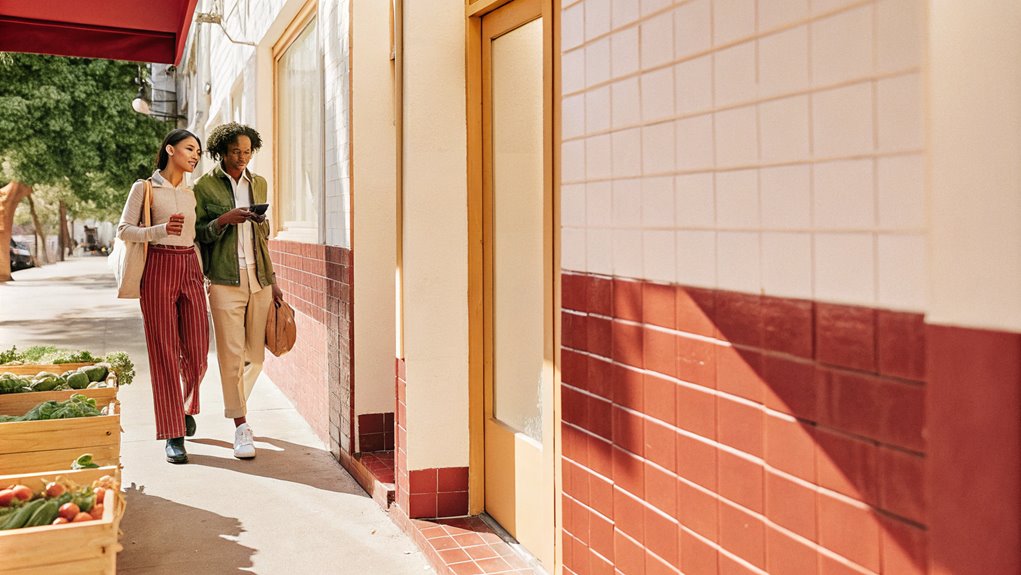
Looking around your new neighborhood is super important. You want to make sure it has everything you need to live a happy life. Drive through the area a few times – in the morning, at lunch, and at night. This helps you see what's close by.
Think about what makes you happy:
- A coffee shop where you can walk to get your morning drink
- A good school close to home for your kids
- A park where you can play and relax
- Stores that sell food and medicine when you need them
Make a list of places you go to every day. Check how long it takes to get there from your new home.
The right shops and places nearby will make your life better and easier.







